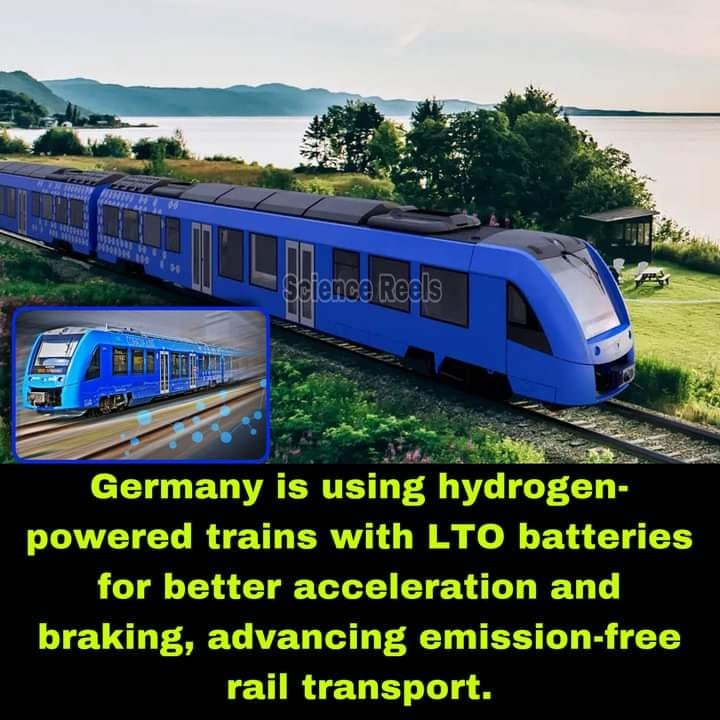Germany, a nation renowned for its technological advancements and commitment to environmental sustainability, is once again at the forefront of innovation. This time, the spotlight is on the railway sector, where a groundbreaking development is poised to revolutionize the way we travel: hydrogen-powered trains equipped with Lithium Titanate Oxide (LTO) batteries. This technological marvel promises to usher in a new era of emission-free, efficient, and sustainable rail transport.

The Power of Hydrogen: A Clean Energy Solution
Hydrogen, often hailed as the “energy carrier of the future,” has the potential to significantly reduce our reliance on fossil fuels and mitigate climate change. When combined with oxygen in a fuel cell, hydrogen produces electricity, emitting only water vapor as a byproduct. This clean energy source offers a compelling solution for various applications, including transportation.
Hydrogen-Powered Trains: A Green Alternative
In the realm of rail transport, hydrogen-powered trains represent a significant step forward. These trains utilize hydrogen fuel cells to generate electricity, powering the train’s propulsion system. This eliminates the need for diesel or electric locomotives, which often rely on fossil fuel-based power plants.
The Role of LTO Batteries: Optimizing Performance
To further enhance the performance and efficiency of hydrogen-powered trains, LTO batteries are being integrated into the system. These advanced batteries offer several advantages:
- Rapid Charging: LTO batteries can be charged incredibly quickly, making them ideal for short layovers and refueling stops.
- Long Cycle Life: LTO batteries have a significantly longer lifespan compared to traditional lithium-ion batteries, reducing maintenance costs and environmental impact.
- Excellent Low-Temperature Performance: LTO batteries retain their capacity even in cold weather conditions, ensuring reliable performance throughout the year.
- Enhanced Safety: LTO batteries are inherently safer than traditional lithium-ion batteries, reducing the risk of thermal runaway and fire hazards.
By incorporating LTO batteries into hydrogen-powered trains, Germany aims to optimize their performance during acceleration and braking. This technology enables the trains to efficiently harness regenerative braking energy, further reducing energy consumption and minimizing environmental impact.
The Benefits of Hydrogen-Powered Trains
The deployment of hydrogen-powered trains offers a multitude of benefits:
- Zero Emissions: Hydrogen-powered trains produce zero harmful emissions, contributing to cleaner air and a healthier environment.
- Reduced Noise Pollution: These trains operate significantly quieter than traditional diesel or electric trains, improving the quality of life for communities living near railway lines.
- Energy Independence: By utilizing domestically produced hydrogen, Germany can reduce its dependence on foreign energy sources and enhance its energy security.
- Economic Growth: The development and deployment of hydrogen-powered trains can stimulate economic growth, create jobs, and foster innovation in the transportation and energy sectors.
Challenges and Future Outlook
While the potential of hydrogen-powered trains is immense, several challenges need to be addressed to ensure their widespread adoption:
- Hydrogen Infrastructure: The development of a robust hydrogen infrastructure, including production, storage, and distribution facilities, is crucial for the successful deployment of hydrogen-powered trains.
- Cost-Effectiveness: The initial costs associated with hydrogen production and fuel cell technology can be higher compared to traditional fuels. However, as technology advances and economies of scale kick in, these costs are expected to decrease.
- Public Acceptance: Educating the public about the benefits of hydrogen-powered trains and addressing concerns regarding safety and environmental impact is essential for gaining public support.
Despite these challenges, the future of hydrogen-powered trains appears promising. With ongoing research and development, coupled with supportive government policies and industry partnerships, Germany and other countries can accelerate the transition to a sustainable and emission-free railway system.
Conclusion
Germany’s deployment of hydrogen-powered trains equipped with LTO batteries represents a significant milestone in the global effort to combat climate change and promote sustainable transportation. By harnessing the power of hydrogen and leveraging advanced battery technology, Germany is paving the way for a greener and more sustainable future. As this technology continues to evolve, we can expect to witness a transformative shift in the way we travel, with hydrogen-powered trains becoming a common sight on railway lines around the world.
